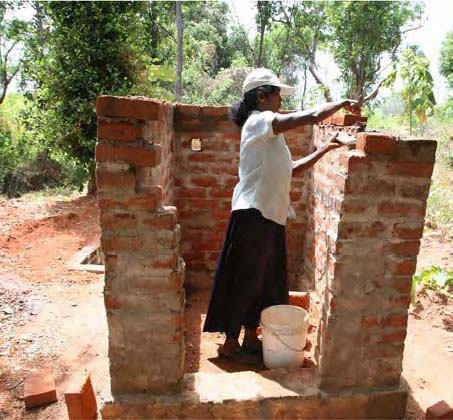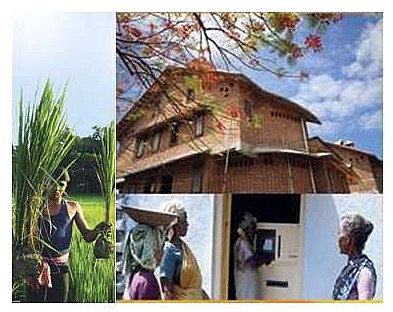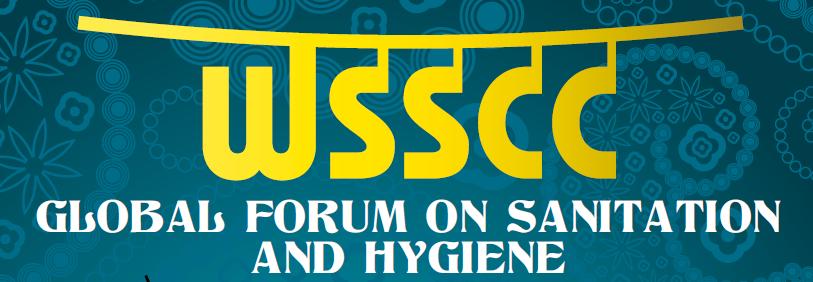/topics/lifestyle
Lifestyle
Report of the committee on slum statistics/census - Ministry of Housing and Urban Poverty Alleviation
Posted on 29 Oct, 2011 04:12 PMThis report by the Ministry of Housing and Urban Poverty Alleviation, Government of India, is the outcome of the deliberations conducted by the committee on slum statistics/census constituted by the Ministry of Housing and Urban Poverty Alleviation in the context of the realisation that there continues
Decentralised treatment and recycling of domestic wastewater - An integrated approach to water management - A pilot project - CPCB (2008)
Posted on 27 Oct, 2011 10:32 AMThis report by the Central Pollution and Control Board (CPCB) describes the various intervention measures chosen to reduce the ecological footprint of the Sangamam housing project at Auroville. These measures include water harvesting, recycling and waste management.
India’s sanitation for all: How to make it happen – A discussion paper by Asian Development Bank
Posted on 26 Oct, 2011 10:40 AM This discussion paper by the Asian Development Bank (ADB) examines the current state of sanitation services in India and offers recommendations that can help key stakeholders work toward universal sanitation coverage in India.
This discussion paper by the Asian Development Bank (ADB) examines the current state of sanitation services in India and offers recommendations that can help key stakeholders work toward universal sanitation coverage in India.
Providing environmentally-safe sanitation to millions of people is a significant challenge, especially in the world’s second most populated country. The task is doubly difficult in a country where the introduction of new technologies can challenge people’s traditions and beliefs.
This discussion paper examines the current state of sanitation services in India in relation to two goals—Goal 7 of the Millennium Development Goals (MDGs), which calls on countries to halve, by 2015, the proportion of people without improved sanitation facilities (from 1990 levels); and India’s more ambitious goal of providing “Sanitation for All” by 2012, established under its Total Sanitation Campaign.
Piloting Knowledge Swaraj - A hand book on Indian science and technology - KICS
Posted on 24 Oct, 2011 04:23 PMThis hand book on Indian science and technology was produced at the end of a project entitled “Science, Ethics and Technological Responsibility in Developing and Emerging Countries” (SET DEV) by Knowledge in Civil Society (KICS). The project aimed at:
- Activating processes of building institutional capacities and skills on science,ethics and STR socialization
- Defining and understanding perspectives of socialization of science and technology that take into consideration local needs in a multilateral dialogue.

Live feed: WSSCC Global Forum on Sanitation & Hygiene - 9-14 October 2011, Mumbai
Posted on 13 Oct, 2011 10:22 AM
We all know the statistics: 2.6 billion people around the world are without access to a basic toilet. Diarrhoea – the vast majority of it due to poor sanitation and hygiene – is the second biggest killer of children worldwide.
Between us, we also have many of the answers. We have experiences of low-cost technologies that are acceptable and affordable for poor communities in rural areas. We have been involved in designing communications programmes that have contributed to sustained behaviour change.
We have seen governments and civil society working together to set up policies and programmes that ensure access to better sanitation in challenging settings, such as crowded informal settlements in fast-growing megacities. We have also seen businesses grow up around sanitation and hygiene, allowing individuals to make a dignified living and clients to buy the sorts of products and services they want and need.
Thirupporur and Vadakkuppattu: Eighteenth century locality accounts – A report by Centre for Policy Studies
Posted on 10 Oct, 2011 08:26 PMThis research monograph on Thirupporur and Vadakkuppatu: Eighteenth Century Locality Accounts, prepared jointly by the Centre for Policy Studies, Chennai and Tamil University, Thanjavur, presents a graphic picture of the society and polity of eighteenth century Tamil Nadu.
Women and water - A collection of papers - Economic and Political Weekly - Volume XLVI - Number 18 - April 30 (2011)
Posted on 07 Oct, 2011 07:31 PMIt does this in the context of the new decentralised governance structures that are based on the assumption that domestic water supply is the legitimate domain of women and thus power and authority needs to be granted to women to manage water resources.
However, there is a very little understanding of how this has benefited women and what are the challenges experienced during the process of implementation or the outcomes gained from these processes, in the context of the Indian society that continues to propogate patriarchal values and is based on structures that are inherently hierarchical and inequitable.
Some of the papers dwell on and explore the inherent biases in the literature and make an attempt to understand their implications for women in managing water resources, while some of the papers share case studies on the outcomes of the implementation of the decentralised water management policies at the village level.
Floods in Orissa wreck havoc and an earthquake in Sikkim leads to a trail of destruction - A comprehensive compilation of recent floods and disaster-related news articles
Posted on 01 Oct, 2011 10:04 AM A look at the news in the month of September 2011, indicates that the month has experienced a range of events such as heavy floods in different parts of the country with Orissa being the worst affected state, a major earthquake in the North East with Sikkim being the most affected, reports of flash floods and landslides in various parts of the country as well as reports of heavy rainfall in different parts of the country with indications that the rainfall may further subside in the coming week.
A look at the news in the month of September 2011, indicates that the month has experienced a range of events such as heavy floods in different parts of the country with Orissa being the worst affected state, a major earthquake in the North East with Sikkim being the most affected, reports of flash floods and landslides in various parts of the country as well as reports of heavy rainfall in different parts of the country with indications that the rainfall may further subside in the coming week.
Regional plan for Goa - Interim report by the task force - Government of Goa (2008)
Posted on 27 Sep, 2011 04:52 PMThe Government of Goa notified a Task Force to develop this plan, which comprised of members of the government, architects, conservationists, and members of the Chambers of Commerce.
The report is divided into the following sections:
Chapter 1: Planning for a better Goa





